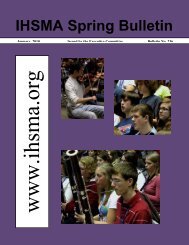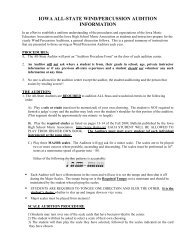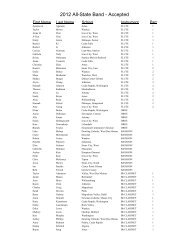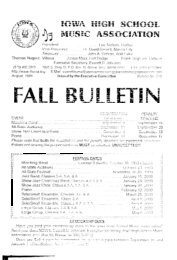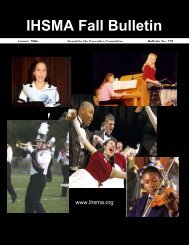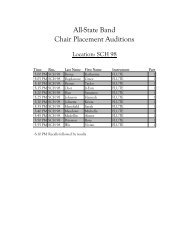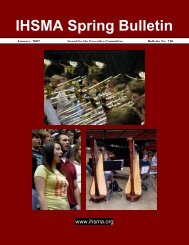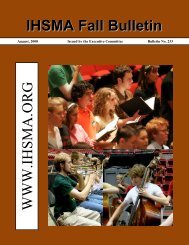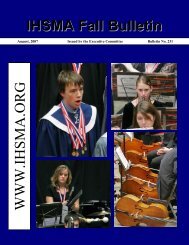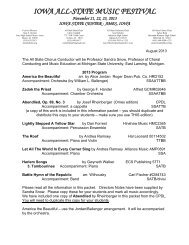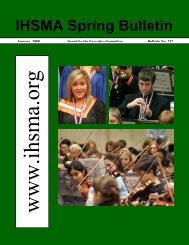Fall Bulletin No. 235 - August 2009 - The Iowa High School Music ...
Fall Bulletin No. 235 - August 2009 - The Iowa High School Music ...
Fall Bulletin No. 235 - August 2009 - The Iowa High School Music ...
You also want an ePaper? Increase the reach of your titles
YUMPU automatically turns print PDFs into web optimized ePapers that Google loves.
II. As children become involved interscholastic activities, they, and their parents, will experience some of the most rewardingmoments of their lives. It’s important to understand there may be times when things do not go the way the childand parent wish. <strong>The</strong>se are the times discussion with the coach/advisor are encouraged.Appropriate concerns for a parent to discuss with a advisor/coach: <strong>The</strong> mental and physical treatment of your child. What your child needs to do to improve. Concerns about your child’s behavior.III. It is very difficult for parents to accept that their child may not be participating as much, or in the role, the parent hadhoped they would. Coaches/advisors make decisions based on what they believe is in the best interests of all studentsparticipating. As one can see from the list above, certain things can and should be discussed with your child’s advisor/coach.Other things, such as those listed next, must be left to the discretion of the coach/advisor.Issues NOT appropriate for discussion with your child’s advisor/coach: How much each student is participating and the role they have. Team strategy. Play calling. Any situation that deals with other students.IV. <strong>The</strong>re are situations that may require communication between the coach/advisor and parent. This communication isnot discouraged, as it is important for each party to have a clear understanding of the others’ position. When such communicationis necessary, the following procedure is suggested to help promote resolution to the issue.If a parent has a concern to discuss with the advisor/coach, the following procedure should be followed: Think about the expected outcome as a result of the meeting. Schedule a time to visit with the coach/advisor face-to-face, in private. <strong>The</strong>se conversations shouldnever take place in public, at practice, at a contest, or performance. If the advisor/coach cannot be reached, call the activities director and ask him or her to set up ameeting with the coach/advisor for you. Stick to discussing the facts, as you understand them.What should a parent do if the meeting with the advisor/coach didn’t provide satisfactory resolution? Call the activities director to set up a meeting with the activities director, coach/advisor, and parent(s)present. At this meeting, an appropriate next step can be determined, if necessary.V. Students’ involvement in co-curricular activities has been proven to increase their chances of success later in life.However, it is important for parents to realize that less than 1% of students participating in co-curricular activitieswill make a living in that activity. Parents should NOT expect their son or daughter to receive a full ride collegescholarship or make a living as a result of their participation in co-curricular activities because, for most, that isnot reality. Parents should encourage their children to participate in co-curricular activities because their children willhave fun, enjoy being with their friends and because of the lifelong values they learn through participation.24



